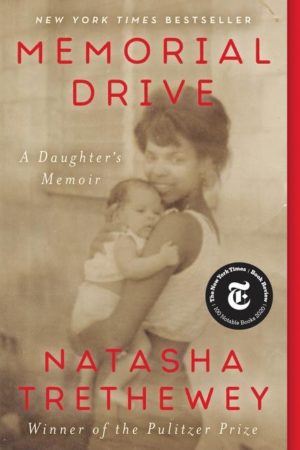Memorial Drive
by Natasha Tretheway
reviewed by Jessica Ciccarelli
In her memoir Memorial Drive, Natasha Trethewey tells the harrowing story of her family’s unraveling, her mother’s murder, and her subsequent struggle to cope. When Trethewey was nineteen, her stepfather, Joel, shot and killed her mother in cold blood outside of her Atlanta apartment. Twenty years later, she tries to make sense of the tragedy, and as we read, we realize there was no reason for such a terrible act—there never is—yet there was every reason to expect it. Joel targeted and tormented young Natasha almost from the moment he arrived. While her mother was at work, Joel repeatedly told Natasha he would commit her to a psychiatric ward and drove her in circles until she was hysterical. He told lies about her appearance and acted to control and humiliate her. And he grew increasingly violent with Natasha’s mother, often threatening to kill her, the children, or himself, if she tried to leave or contact anyone.
A Pulitzer Prize-winning poet, Trethewey movingly renders the experience of an abused child who believes she should have done something more, for her mother and her brother and maybe even herself. I’ve rarely seen trauma, and its association with guilt and shame, depicted so brilliantly.
In a prologue, Trethewey writes,
I’ve seen the depression a once covered nail head can leave when a house settles, a pock in the drywall like a wound opening from beneath the surface. That’s what’s drawn me back: the hidden, covered over, nearly erased.
This description resonates throughout the book. Trethewey’s structure ambles between past and present, in the same way we might see a wound open on dry wall from an old harm. In the beginning, she shows a picturesque childhood. Before her parents’ divorce, it seems as though Trethewey led an almost perfect life, from what she remembers. This, even as her youth is clouded by harm; when she is no more than a few years old, and her family still lives in Gulf Port, Mississippi, the Klan burns a cross in her driveway. This is one of the few dark stories that mark those early years, though she is too young to remember it herself. Instead, an abundance of joy fills the pages, which later feeds our hunger to understand what happened and what went wrong. There are also moments of jarring reality, when Trethewey steps away from the chronological narrative and presents evidence about her mother’s case, and lets the reader interpret. Though this “jarring-ness” could be a criticism of another book, I think that here its effect is powerful—as if Trethewey is asking us to be as confounded and shaken as she was, over and over.
This is felt most keenly when Trethewey introduces narration in the second person, using “you” instead of “I,” in chapter six. She begins, “You remember even though you don’t want to: your mother saying, Big Joe wants to adopt you; saying, He wants you to have his last name.” From this, we infer, Trethewey feels badly enough about what’s happening that she has to detach herself from it, and the second person is the manifestation of this feeling. This avoidance could be a consequence of shame or guilt. She seems to feel somehow responsible for the circumstances that allowed her mother to be murdered. This is corroborated earlier, in chapter four, when she writes, “When I try to make sense of it now, I can’t understand why I did not confide in her [Natasha’s mother, of Joel’s abuse], and I can’t help asking myself whether her death was the price of my inexplicable silence.” Tragically, this is common for children who are abused, and Trethewey is no different. She should have saved her mom, kept quiet, not angered Joel, just agreed to everything. We see Trethewey detach on the page before us, and in so doing, we live her trauma response with her. What ultimately fails her as a means of coping succeeds brilliantly as a narrative tool.
Memorial Drive is a literary marvel that marries grief and murder mystery. We know who killed her mother, yet still Trethewey moves the narrative forward with finesse and intensity, leaving the reader on the edge of their seat. She brings together evidence, journaling, dreamscape, reflection. Anyone who wants to understand grief, guilt, and responsibility, or cycles of abuse and entrapment, should read this book. The same goes for anyone who wants to see someone grapple with tragedy through genuine self-analysis and exploration. As Trethewey concludes, “Even my mother’s death is redeemed in the story of my calling, made meaningful rather than merely senseless. It is the story I tell myself to survive.” In her own tragic discovery, I also found meaning; merely by making this journey with her, I learned something profound about surviving.
Published on May 5, 2021

